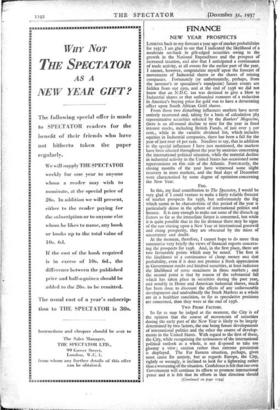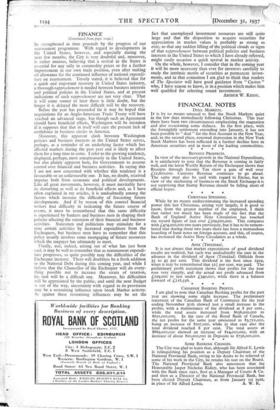FINANCE
NEW YEAR PROSPECTS LOOKING back to my forecast a year ago of market probabilities for 1937, I am glad to see that I indicated the likelihood of a moderate set-back in gilt-edged securities owing to the growth in the National Expenditure and the prospect of increased taxation, and also that I anticipated a continuance of trade activity, at all events for the earlier part of the year. I cannot, however, congratulate myself upon the forecast of movements of Industrial shares or the shares of mining companies. Fortunately (or unfortunately, perhaps, from the investor's or speculator's standpoint) future events are hidden from our eyes, and at the end of 1936 we did not know that an N.D.C. tax was destined to give a blow to Industrial shares or that unfounded rumours of a reduction in America's buying price for gold was to have a devastating effect upon South African Gold shares.
From those two disturbing influences markets have never entirely recovered and, taking for a basis of calculation 365 representative securities selected by the Bankers' Magazine, there is an all-round decline to note for the year in fixed interest stocks, including British Funds, of just over 5 per cent., while in the variable dividend list, which includes equities in Industrial companies, there has been a fall for the year of just over 16 per cent. Needless to say, that in addition to the special influences I have just mentioned, the markets have been affected throughout the year by anxieties concerning the international political situation, while the material decline in industrial activity in the United States has occasioned some repercussions on this side of the Atlantic. Fortunately, the closing months of the year have witnessed some slight recovery in most markets, and the final days of December were characterised by some degree of optimism concerning the New Year.
FOG.
In this, my final contribution to The Spectator, I would be very glad if I could venture to make a fairly reliable forecast of market prospects for 1938, but unfortunately the fog which seems to be characteristic of this period of the year is particularly dense in the sphere of international politics and finance. It is easy enough to make out some of the disturbing factors so far as the immediate future is concerned, but while it is quite possible that in the far distance there may be signs of the sun shining upon a New Year or international goodwill and rising prosperity, they are obscured by the mists of uncertainty and doubt.
At the moment, therefore, I cannot hope to do more than summarise very briefly the views of financial experts concern- ing the prospects for 1938. And, in the first place, there are two favourable points which may be noted. The first is the likelihood of a continuance of cheap money and that probability, even if it does not promise a fresh appreciation in Government stocks and kindred securities, at least indicates the likelihood of some steadiness in those markets ; and the second point is that by reason of the substantial fall which has taken place in securities during the past year and notably in Home and American industrial shares, much has been done to discount the effects of any unfavourable developments and undoubtedly the Stock Markets as a whole are in a healthier condition, so far as speculative positions are concerned, than they were at the end of 1936.
Two PRIME FACTORS.
So far as may be judged at the moment, the City is of the opinion that the course of movements of securities during the early part of the Nzw Year is likely to be largely determined by two factors, the one being future developments of international politics and the other the course of develop- ments in the United States. With regard to the first of these the City, while recognising the seriousness of the international political outlook as a whole, is not disposed to take too gloomy a view ; caution rather than extreme pessimism is displayed. The Far Eastern situation, perhaps, gives most cause for anxiety, but as regards Europe, the City, rightly or wrongly, is inclined to look for a lightening rather than a worsening of the situation. Confidence is felt that our own Government will continue its efforts to promote international peace and it is felt that its efforts in that direction should (Continued on page 1194)
FINANCE
(Continued from page 1192.) be strengthened as time proceeds by the progress of our rearmament programme. With regard to developments in the United States, however, and especially during the next few months, the City is very doubtful and, moreover, is rather anxious, believing that a revival in the States is essential for any rally in commodity prices or for a further improvement in our own trade position, even after making all allowance for the continued influence of national expendi- ture on rearmament. Tersely stated, it is believed that for a quick and important recovery in United States industry, a thorough rapprochement is needed between business interests and political policies in the United States, and at present indications of such rapprochement are not very clear. That it will come sooner or later there is little doubt, but the longer it is delayed the more difficult will be the recovery. Before the year has proceeded far it may be hoped that negotiations for an Anglo-American Trade Treaty will have reached an advanced stage, but though such an Agreement should have beneficial effects, Washington will be mistaken if it supposes that that in itself will cure the present lack of confidence in business circles in America.
Moreover, this apparent clash between Washington policies and business interests in the United States serves, perhaps, as a reminder of an underlying factor which has affected markets during the past year and is likely to affect them for a long time to come. I refer to the growing tendency, displayed, perhaps, most conspicuously in the United States, but also plainly apparent here, for Governments to assume control over financial and business activities. In saying this I am not now concerned with whether this tendency is a favourable or an unfavourable one. It has, no doubt, received impetus both from economic and political developments. Like all great movements, however, it must inevitably have its disturbing as well as its beneficial effects and, as I have often explained in my articles, it is undoubtedly among the factors which increase the difficulty of forcasting future developments. And if by reason of this control financial writers find difficulty in indicating the future course of events, it must be remembered that this same difficulty is experienced by bankers and business men in shaping their policies affecting the extension of their financial and business activities. Statesmen and politicians may stimulate for a time certain activities by increased expenditure from the Exchequers, but business men have to remember that this policy usually involves some mortgaging of future resources which the taxpayer has ultimately to meet.
Finally, and, indeed, arising out of what has just been said, it may be well to remember that as rearmament expendi- ture progresses, so quite possibly may the difficulties of the Exchequer increase. There will doubtless be a fresh addition to the National Debt during this coming year, and while I believe that the Chancellor of the Exchequer will do every- thing possible not to increase the strain of taxation, his task will be a difficult one. Moreover, his difficulties will be appreciated by the public, and until the next Budget is out of the way, uncertainty with regard to its provisions may be a restraining influence upon Stock Market activity. As against these restraining influences may be set the fact that unemployed investment resources are still quite large and that the disposition to acquire securities for appreciation in market values is probably as strong as ever, so that any sudden lifting of the political clouds or signs of that rapprochement between political policies and business interests in the United States to which I have already referred, might easily occasion a quick revival in market activity.
On the whole, however, I consider that in the coming year it will be more necessary than ever for investors carefully to study the intrinsic merits of securities as permanent invest- ments, and in that connexion I am glad to think that readers of The Spectator will have good guidance from " Custos " who, I have reason to know, is in a position which makes him well qualified for selecting sound investments.
ARTHUR W. KIDDY.

































 Previous page
Previous page